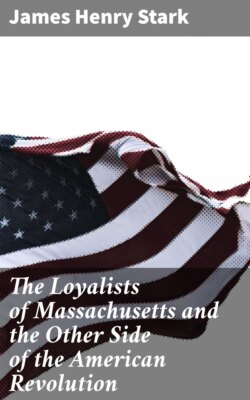Читать книгу The Loyalists of Massachusetts and the Other Side of the American Revolution - James Henry Stark - Страница 5
На сайте Литреса книга снята с продажи.
INTRODUCTION.
ОглавлениеTable of Contents
At the dedication of the monument erected on Dorchester Heights to commemorate the evacuation of Boston by the British, the oration was delivered by that Nestor of the United States Senate, Senator Hoar.
In describing the government of the colonies at the outbreak of the Revolution, he made the following statement: "The government of England was, in the main, a gentle government, much as our fathers complained of it. Her yoke was easy and her burden was light; our fathers were a hundred times better off in 1775 than were the men of Kent, the vanguard of liberty in England. There was more happiness in Middlesex on the Concord, than there was in Middlesex on the Thames."[1] A few years later Hon. Edward B. Callender, a Republican candidate for mayor of Boston, in his campaign speech said: "I know something about how this city started. It was not made by the rich men or the so-called high-toned men of Boston—they were with the other party, with the king; they were Loyalists. Boston was founded by the ordinary man—by Paul Revere, the coppersmith; Sam Adams, the poor collector of the town of Boston, who did not hand over to the town even the sums he collected as taxes; by John Hancock, the smuggler of rum; by John Adams, the attorney, who naively remarked in his book that after the battle of Lexington they never heard anything about the suits against John Hancock. Those were settled."[2]
These words of our venerable and learned senator and our State Senator Edward B. Callender, seemed strangely unfamiliar to us who had derived our history of the Revolution from the school text-books. These had taught us that the Revolution was due solely to the oppression and tyranny of the British, and that Washington, Franklin, Adams, Hancock, Otis, and the host of other Revolutionary patriots, had in a supreme degree all the virtues ever exhibited by men in their respective spheres, and that the Tories or Loyalists, such as Hutchinson, the Olivers, Saltonstalls, Winslows, Quincys and others, were to be detested and their memory execrated for their abominable and unpatriotic actions.
This led me to inquire and to examine whether there might not be two sides to the controversy which led to the Revolutionary War. I soon found that for more than a century our most gifted writers had almost uniformly suppressed or misrepresented all matter bearing upon one side of the question, and that it would seem to be settled by precedent that this nation could not be trusted with all portions of its own history. But it seemed to me that history should know no concealment. The people have a right to the whole truth, and to the full benefit of unbiased historical teachings, and if, in an honest attempt to discharge a duty to my fellow citizens, I relate on unquestionable authority facts that politic men have intentionally concealed, let no man say that I wantonly expose the errors of the fathers.
In these days we are recognizing more fully than ever the dignity of history, we are realizing that patriotism is not the sole and ultimate object of its study, but the search for truth, and abiding by the truth when found, for "the truth shall make you free" is an axiom that applies here as always.
Much of the ill will towards England which until recently existed in great sections of the American people, and which the mischief-making politician could confidently appeal to, sprung from a false view of what the American Revolution was, and the history of England was, in connection with it. The feeling of jealousy and anger, which was born in the throes of the struggle for independence, we indiscriminately perpetuated by false and superficial school text-books. The influence of false history and of crude one-sided history is enormous. It is a natural and logical step that when our children pass from our schoolroom into active life, feelings so born should die hard and at times become a dangerous factor in the national life, and it is not too much to say that the persistent ill will towards England as compared with the universal kindliness of English feeling towards us, is to be explained by the very different spirit in which the history of the American Revolution is taught in the schools of one country and in those of the other.
